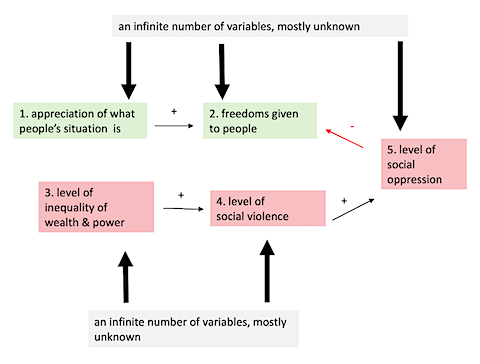
photo from a women’s march, source not cited
As a student of history, I’m always a bit astonished to discover how much things have changed in a seemingly short period of time. Not always for the better, of course. But when you read stories about things that happened just a few short decades ago, you tend to have one of two reactions: Wow, I hadn’t realized, or Wait a minute, that’s being spun. When we have a particular ideology or vision about the trajectory of things, we tend to focus on and possibly exaggerate differences that appear to confirm that trajectory, and to discount as unrepresentative those that contradict it.
So I’ll say it again: We tend to believe what we want to believe. What we’ve been conditioned to believe. Truth, and facts, be damned.
I’ve been updating my family’s genealogy, and one discovery was that my ggg-uncle, Stephen Ballard Pollard, the first doctor among the “Sheridan” Pollards that arrived in Canada in 1807, spent five years in the notorious Kingston Penitentiary in Ontario starting in 1909 — for performing abortions. As I went to share this information with family and friends I suddenly realized: I don’t know that everyone in my family would consider him, as I do, a hero; and it has been only a few short decades since women here have had this one small freedom from state oppression.
I remember attending a protest to support Henry Morgentaler, the Nazi death camp survivor who was imprisoned by the Trudeau (Sr) regime for performing illegal abortions in the 1970s, being freed from a lifetime of outrageous harassment and threats only when the law was ruled unconstitutional in 1988. Since then, Canada’s Conservative party tried to re-criminalize abortion in Canada under the disgusting Mulroney regime in the 1990s, and nearly succeeded. The party continues to agitate periodically for re-criminalization, and all of Mulroney’s successors have said they “personally” oppose abortions. It’s hard to believe this change is so recent — and so vulnerable to undoing.
There are two realizations here, that by our nature we tend to forget: How dramatically things can change over time (rarely quickly or dramatically enough that we are really aware the degree of change); and how, similarly, those changes can be undone, sometimes without our noticing. The poster at a rally for women’s freedom over their own reproductive systems a few years ago said it all: “I can’t believe we’re still having to protest this shit!”
This blog provides me with an all-too-sobering irrefutable reminder of how much I have changed — my beliefs, my sense of self-awareness, my whole worldview — since I began blogging in 2003, and particularly since I retired in 2010. I can only shake my head at some of the things I said (and how I said them) back then. It’s almost as if another person, a very “blame-y” person with very different sensibilities (and a disturbing propensity for getting sucked into conspiracy theories), wrote most of my early posts.
I have always been a fan of system thinking, and the reasoning charts that can enable why things seemingly change. A few years ago I would have created a credible chart explaining the current status of women’s reproductive choice in Canada, complete with causes and effects and positive and negative feedback loops.
But now I can only see such charts as massive oversimplifications, at best useless and at worst dangerous. Based on what I’ve learned about conditioning and free will, not to mention radical non-duality, as compelling as these cause-and-effect diagrams may be (to those who think like me, anyway), I’m not sure they do more than coincidentally appear to describe the dynamics at play.
If we are all simply a product of our conditioning, the apparent trajectories and backsliding that we see as happening are just epiphenomena, and our labels and judgement about them, even when widely shared by others (those who we most effectively co-condition) are merely highly selective patterning of something so staggeringly complex that it cannot possibly really be understood. It’s akin to seeing sheep figures in the clouds. If there is causality, it’s the collective result of 7.8B people’s conditioned reactions to ever-changing circumstances, and it is utterly unfathomable.
I am constantly annoyed at the endless, useless, unresolvable debate about whether climate collapse is human-caused. Who gives a shit and what difference does it make? The fact that it’s happening is irrefutable. The reasons for it are irrelevant. And it is equally obvious, at least to all climate scientists I have met or communicated with, that we cannot “fix” it, for the same reason — it is so unfathomably complex that we cannot even begin to understand it or reliably forecast what it might be leading to or what any human interventions might produce.
So if I were to now create a systems chart of Canada’s women’s reproductive choice as it stands today, it might look something like the diagram below:

Those with conditioning similar to mine would probably agree that working to increase (1) and to decrease (3) is worthy work, as it is likely to have some positive effect on (2), (4) and (5). The problem is, we can’t know the stuff in the grey areas, which will have a disproportionate effect. We might like to believe that we can intelligently guess at least the major factors in the grey areas. But history suggests we cannot.
And suppose you’re an old-fashioned conservative Joe who has been conditioned to distrust women and to like patriarchy (everyone knows their place) and populist autocrats (not to name any names). What Joe might see as box (1) is “earn freedom through hard work”, and what Joe might see as box (3) is “lack of morals and respect for authority”. Otherwise, same situation, same chart. But Joe’s conditioning would be the opposite to ours, and depending on numbers and level of passion, the Joes of the world might be more effective than us, leading to a worsening, not an improvement, of supposed outcomes. Joe’s perception of the current trajectories is likely to be nearly the opposite of ours. All because we have been differently conditioned, by our genes, our immediate culture, and what we have been exposed to (ideas, knowledge, people, perspectives etc).
And believing this doesn’t (at least immediately or significantly) change what we will do, and what the Joes will do. Our chat with Joe will inevitably have a minuscule effect on both our conditioning, unlikely to be enough to, on balance, chance our conditioned reactions in the future.
Of course, we have to try. We are conditioned not to give up just because the chances of “success” as we each define it, are negligible.
I have, of course, nothing to suggest, since I don’t think we have any free will to do other than what were conditioned to do. I just think it’s interesting to see where our seeming motivations are actually coming from, and what effect they might actually have.
These amazing brains which we think of as ‘ours’ are just furiously abstracting patterns from incoming signals — energy flows —, and assigning significance to them. That is what brains do. We have no choice but to listen to them and take ownership for what they tell us. But I am increasingly convinced that what they are telling us is completely wrong — most notably that there is an ‘us’ listening to them, claiming them.
Fortunately, or unfortunately, ‘we’ will never know.





Thanks for this, Dave. I appreciate your pov and share many aspects of it.
All well and good to be humble and empathetic, but sometimes there are circumstances when “Joe” has had it with us, or vice versa, and a determination is made that the only ‘solution’ is to exterminate the other side. What then?
The solution, it will of course be said, is that everyone should accept and respect the humanity of everyone else. After all, lots of people think tolerance is a virtue, including me. Except that if there are those among us who do not wish to go down that virtuous path, then those who do, the tolerant, will be destroyed and the intolerant will survive.
Survival of the fittest? Perhaps not, but only the survivors get to write the history books. That’s why so many of them are in English and so few in Ojibwa.
Of course we perceive what we want to perceive (https://aeon.co/essays/how-our-brain-sculpts-experience-in-line-with-our-expectations). Systems thinking and system dynamics are tools that express the models of the owners of the problems, which are as good as their, usually biased and incomplete, mental models. ST/SD does not make the models although it helps in that task. The capture of the mental model of the owner of the problem is key and should be done in a way that escapes the trap of the problem owner’s biases.